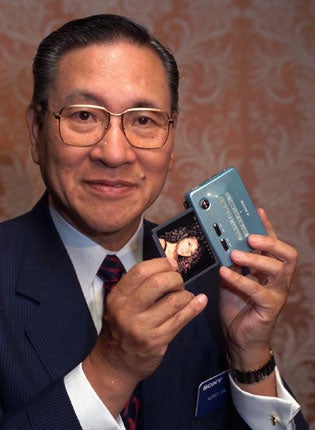Music stops for man who created CDs – in homage to Beethoven

Your support helps us to tell the story
From reproductive rights to climate change to Big Tech, The Independent is on the ground when the story is developing. Whether it's investigating the financials of Elon Musk's pro-Trump PAC or producing our latest documentary, 'The A Word', which shines a light on the American women fighting for reproductive rights, we know how important it is to parse out the facts from the messaging.
At such a critical moment in US history, we need reporters on the ground. Your donation allows us to keep sending journalists to speak to both sides of the story.
The Independent is trusted by Americans across the entire political spectrum. And unlike many other quality news outlets, we choose not to lock Americans out of our reporting and analysis with paywalls. We believe quality journalism should be available to everyone, paid for by those who can afford it.
Your support makes all the difference.He gave up his dream of being an opera singer to join a fledgling consumer electronics maker. Norio Ohga will be remembered by most as the man who developed the compact disc, pushing for a diameter of 12cm to allow for 75 minutes of uninterrupted music, enough to store Beethoven's Ninth Symphony in its entirety.
Mr Ohga, who eventually became the president and chairman of Sony, has died of multiple organ failure aged 81. He was recruited into what was then called Tokyo Telecommunications Engineering in the late 1950s after writing to complain about the sound quality of its tape recorders. Sony's founders were intrigued by this boisterous young man, whose love of music and knowledge of sound shone through, and promptly snapped him up before he could capitalise on his training as a baritone.
Mr Ohga became an executive in his 30s, a rarity in a Japanese company, and ultimately rose through the ranks to serve as president of Sony from 1982 to 1995 and as chairman until 2000. He remained a senior adviser to the company until his death.
From the very beginning, the flamboyant Mr Ohga recognised the potential of the CD's superior sound quality and ignored sceptics in the 1970s who wanted to keep vinyl records alive.
Sony sold the world's first CD in 1982 and the discs proved so popular that they overtook LP record sales in Japan within five years. Mr Ohga's eccentric 75-minute specifications are still in use today and have shaped the format of subsequent home entertainment developments including the DVD.
Mr Ohga was adamant that Sony, which started life as a radio repair shop in 1945, should blossom from a simple electronics hardware maker into an ambitious and wide-ranging entertainment company spanning music, films and video games. In 1998, he told the Associated Press: "We are always chasing after things that other companies won't touch. That is a big secret to our success."
Some of the decisions made during his presidency were not so successful, such as the $3.4bn (£2bn) purchase of the Hollywood studio Columbia Pictures, which was denounced at the time as unwise and costly. But Mr Ohga also presided over the launch of the company's games business, which went on to develop the lucrative PlayStation console.
Sony's current chairman, Sir Howard Stringer, said his predecessor's foresight and vision transformed the company into a global entertainment leader. "By redefining Sony as a company encompassing both hardware and software, Ohga-san succeeded where other Japanese companies failed," he said.
With his slicked-back hair and fiery artistic temperament, debonair Mr Ohga shattered the stereotype of the staid Japanese businessman and added a touch of glamour to Sony as it exploded on to the global stage.
A graduate of the Tokyo National University of Fine Arts and Music and Berlin University of the Arts, he once conducted the Metropolitan Opera Orchestra in New York at a charity event funded by Sony. He often compared leading a company to conducting an orchestra, stressing that both involved drawing on the talents of other people.
Join our commenting forum
Join thought-provoking conversations, follow other Independent readers and see their replies
Comments